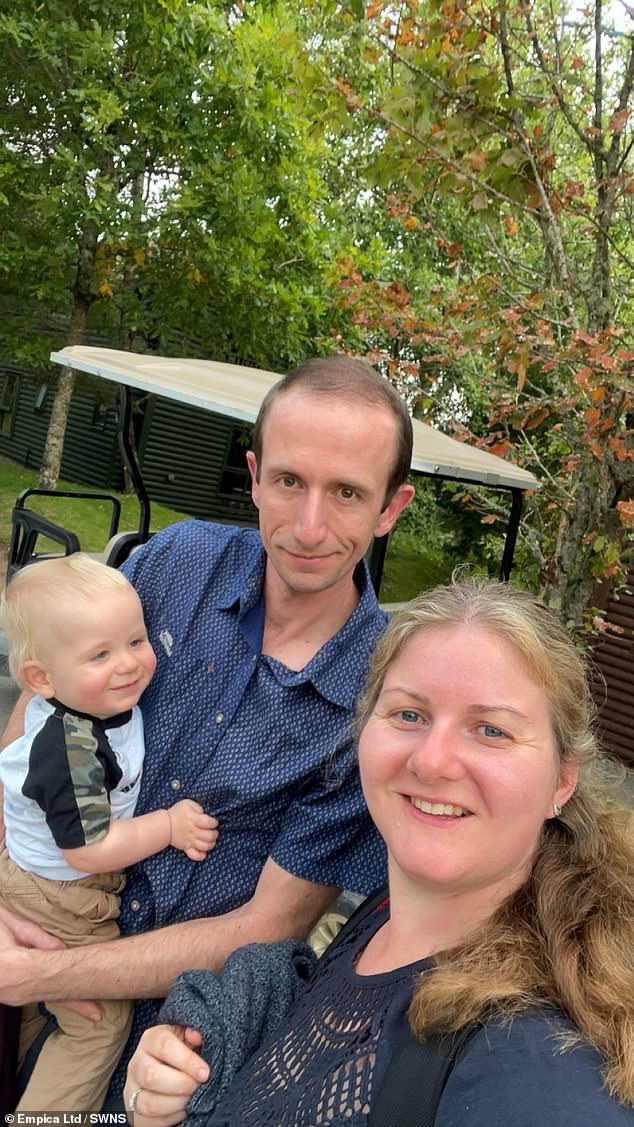A father-of-one who survived two bouts of killer cancer has urged men not to ‘die of embarrassment’ and seek help for intimate problems.
Simon Dix, 42, a support worker from Somerset, was hit with testicular cancer in July 2018, aged just 36, after spotting signs of swelling.
He initially found the symptom, medically known as an enlarged testicle, ‘difficult to talk about’, but eventually went to see his GP.
After a round of tests and referral to hospital he was diagnosed with the disease —which affects around 2,400 men every year.
Doctors were forced to remove both his testicles in order to give him the best chance of survival.
Prior to the operation, he chose to have his sperm frozen — in case he decided he wanted a family in the future.
‘It is definitely worth it,’ he said of the fertility-preservation treatment. ‘It gives you that option and stops the cancer limiting your life choices.
‘You might regret not doing it once your fertility is gone, and life is too short for regrets.’

Simon Dix has urged men not to ‘die from embarrassment’ and seek help as soon as they notice a problem
The treatment worked and, within a few months of the surgery, he was declared cancer-free.
Mr Dix tried to put the illness behind him and eventually met the woman who would become his life partner at the end of 2018, nursery practitioner, Sarah, now 37.
But just a few months after meeting the person he ‘wanted to share life and build a family with’, Mr Dix’s cancer returned.
During a routine blood test as part of his oncology monitoring, doctors discovered signs that cancer may be circulating in his blood.
An MRI scan was performed that eventually confirmed his cancer had returned in his groin, and a course of chemotherapy was needed to destroy it.
The second diagnosis was a ‘real shock and come down’, he said.
‘Sarah stood by me through the cancer – I gave her the option to walk away and she wouldn’t.
‘She was my rock, supporting me through the treatment. I didn’t want the cancer to deny me any opportunity in life.

Mr Dix was shocked when the disease returned in his groin a year after he was given the all clear
‘When you face something life-threatening, you think hard about what you want out of life and it was to find someone to share life with to build a family with – that became more relevant once I met Sarah.’
When his treatment finished, and he was once-again declared free from disease, the couple decided to investigate the possibility of starting a family using the sperm he had frozen the year prior.
The pair eventually began IVF treatment, which ‘wasn’t easy’.
‘It’s especially difficult for women,’ he said. ‘It can be very invasive with all the injections and treatments, and there are several stages where it can falter, but to make it through that process heightened the happiness.’
The fertility treatment was a success, and on October 14 2023, the couple welcomed their first child, Finlay, into the world.
‘He’s our miracle child,’ said Mr Dix.
‘We didn’t think we would be able to have children. We were hoping for the best but there was always a lot of uncertainty.
The day Finlay was born was just complete joy and exhilaration. It was the happiest feeling, it’s the culmination of all our dreams coming true.

The couple’s son, Finlay, is a ‘miracle’, conceived with the help of IVF that involved using sperm frozen prior to cancer treatment

‘It is definitely worth it,’ he said of the fertility-preservation treatment. ‘It gives you that option and stops the cancer limiting your life choices.
‘Without children there would be something missing in our lives, and so we are forever grateful.’
Now, Mr Dix is encouraging other men to watch out for the early signs of testicular cancer, and seek help quickly.
‘At the start, I always found it difficult to talk about it,’ he said. ‘But the sooner you get checked out the better.
‘You don’t want to literally die from embarrassment, it’s better to cope with the embarrassment than kick yourself if you leave it too late and give yourself less of a chance of surviving.
‘Basically, get over yourself.’
Testicular cancer usually affects just one testicle, but it is possible for tumours to grow in both.
The most common symptoms include a lump or swelling in the testicle, an ache or pain in the genitals or lower tummy and the testicle increasing in size.
Some patients feel the scrotum feeling heavy, firm or hard, according to the NHS.
More than 9 in 10 men in England diagnosed with the disease between 15 and 54 years-old will live for at least a decade.







